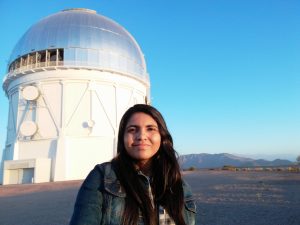
Maria Elidaiana is a postdoctoral researcher at Brandeis University. She studies galaxy clusters via weak gravitational lensing. Specifically, she’s working on a new way to estimate galaxy cluster mass based on stellar masses. “The nice thing about this new method is the fact that we take into account not only red galaxies (red sequence) but also the blue ones (blue cloud). We expect that the fraction of blue galaxies increases when we go to higher redshifts (DES should reach redshift (z) ~1 in the Year 5 analysis), therefore, we need to understand the impact of blue galaxies in the mass calibration and consequently, in cluster cosmology.”
She also recently started working with the gravitational wave (GW) team in DES. She’s trying to use GW events in combination with other observables to increase the constraining power of the estimation of cosmological parameters. “We need many more GW events than we have right now for this kind of analysis to achieve the level of precision of traditional methods in cosmology, but it’s a novel and very promising topic.”
We asked Maria a few more questions. Here’s what she had to say:
What motivates or inspires you?
I am very curious about the Universe and how it works. It has fascinated me since I was a kid. But I am also motivated to overcome the challenges that someone like me has to face to become a scientist. As a Brazilian, first-generation scientist and a minority in other ways, I had to prove myself all the time during my journey to become a scientist. I had to prove that a person like me can do physics, can earn a PhD, and can do science. I will probably face many other challenges in my professional life. But now it is okay because I have proven to myself that I am good enough and that’s what matters. And this is also one of the reasons I love doing science: to inspire other people like me and show that they can become a scientist too.
What is your favorite space-related image, and why?
My favorite image is one of the photographic plates of Sobral’s eclipse of May 29, 1919 (https://daed.on.br/sobral/imgs-eclipse/ECLIPSE%20-%20ORIGINAIS/Placa%20VIII.png). A century ago, this famous eclipse helped prove Einstein’s General Relativity theory by showing that the gravitational field of a massive object (like the Sun) could deflect the light of distant objects (other stars in this case). This was the beginning of gravitational lensing studies, which is now my main area of research. Coincidentally, I was born in a small city very close to Sobral, called Tianguá (in the state of Ceará in Brazil). These connections make this picture very special to me.
What is your favorite book?
My favorite book is the trilogy “Foundation” by Isaac Asimov (actually, there are more than 3 books related to this trilogy, I still need to read one of them). It’s a great book and the one that “predicted” Wikipedia. I like this book because Asimov uses a lot of scientific concepts in a very nice way (e.g., general relativity to explain how the spaceship travels work). It is also very interesting how he uses scientists as “the chosen ones” to save the Galactic Empire…but not really, you will see.
What do you think has been the most exciting advance in physics / astronomy in the last 10 years?
I think it is almost unanimous that gravitational wave detection was the most exciting thing in astronomy in the last 10 years. Another exciting thing was the detection of the electromagnetic counterpart of the GW170817 event by several teams (including DES) in different wavelengths. In particular, I’m fascinated by the prospect of using GW events to help to solve the Hubble parameter tension and shed light on the issue of the accelerated expansion of the Universe. It seems that we will have many more exciting things happening in the near future in this new multi-messenger astronomy field!
What’s a fun fact about yourself?
I’m a fan of Japanese anime (cartoons) and mangas (comics), which were really a thing for most Brazilian kids in the 90s. And I am still waiting for the last Evangelion!
Any advice for aspiring scientists?
I think the advice I can give for someone who wants to become a scientist is: i) surround yourself with good friends that will support you and listen to your struggles; ii) do something for your community, participate in outreach events, show your science to the taxpayers. We need the support of society and they need to know what we are doing for them; iii) take care of your physical and mental health: don’t skip lunch and sleep!